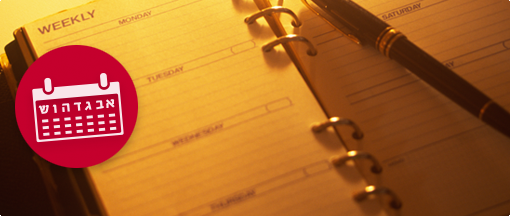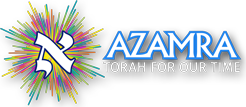
Torah Calendar
5-18 Adar, 5786
February 22-March 7, 2026
For this week's study schedule & classes, CLICK HERE
• When Adar arrives, we maximize SIMCHAH •
Monday night-Tuesday February
16-17 / 30 Shevat
ROSH CHODESH ADAR First Day
First day of Rosh Chodesh, New Moon of Adar. Ya'aleh VeYavo, "Half" Hallel and the additional Musaf service are recited on both days of Rosh Chodesh and it is customary to mark these days with more festive meals than usual.
Tuesday night-Wednesday
February
17-18 / 1 Adar
ROSH CHODESH ADAR Second Day
Second day of Rosh Chodesh, New Moon of Adar. Ya'aleh VeYavo, "Half" Hallel and the additional Musaf service are recited on both days of Rosh Chodesh and it is customary to mark these days with more festive meals than usual.
Friday night-Saturday February 20-21/ 4 Adar
Shabbat TERUMAH
Torah reading: Exodus 25:1-27:19 explaining the design of the Sanctuary that Moses was to build in the Wilderness and its vessels. Haftara: 1 Kings 5:26-6:13 telling how King Solomon built the Temple in Jerusalem.
Monday night-Tuesday 23-24 February / 7 Adar
Yahrzeit of Moshe Rabbenu -- Moses -- who died in the year 2488 (1272 B.C.E.) On Moses' yahrzeit it is appropriate to strengthen oneself in faith in Moses and the Torah: "And they believed in HaShem and in Moses His servant" (Exodus 14:31). On this day Breslover Chassidim customarily recite prayers from Likutey Tefilot on the theme of attachment to the true Tzaddik (e.g. Part I, Prayers 18, 30 and 64; Part II Prayers 7 & 20).
Friday night-Saturday 27-28 February / 11 Adar
Shabbat Parshat TETZAVEH
Shabbat ZACHOR ("Remember")
Torah reading: Exodus 27:20-30:10 explaining the design of the priestly garments of Aaron and his sons and rituals with which they were to be inaugurated into the priesthood.
Special additional reading: Parshas Zachor (Deut. 25:17-19) giving the Torah mitzvah to recall the hatred of Amalek for Israel and to wipe out all memory of Amalek. It is a mitzvah for every male to hear this Torah reading, and many women also customarily attend the synagogue to hear it.
Haftara: I Samuel 15:1-33 describing King Saul's war against Amalek.
Today is the yahrzeit of Rabbi Chayim Yosef David Azulai, the "Chida" 1724-1806.
Sunday 1 March / 12 Adar
Preparing for Purim:
For maximum enjoyment of the supreme holiness of the coming days of Purim this coming Monday night-Wednesday March 2-4, plan ahead where you and all your family will hear Megillat Esther. Set aside money for Matanot La-Evyonim, "Gifts to the Poor" and other charitable contributions on Purim. Prepare your Mishlo'ach Manot, portions of ready-to-eat foods to be sent to your friends, and plan your Purim feast.
"And you shall guard your souls very much"
(Deut. 4:15)
Parents: Please do not allow your children to throw firecrackers, smoke cigarettes, get drunk or engage in other dangerous antics during the Purim season.
Monday March 2 / 13 Adar
The Fast of Esther
We fast today in commemoration of the fast called by Queen Esther in face of Haman's decree to exterminate the Jews. The fast commences at dawn. One who must eat prior to the dawn in order to fortify himself for the fast should state his intention to do so before going to sleep the night before.
After the afternoon Minchah prayer it is customary to give three halves of the coin that is the basis of the local currency to charity in memory of the annual half-shekel contributed by every Israelite in support of the Temple services.
Monday night March 2 / 14 Adar
PURIM NIGHT
Throughout the world (except in Jerusalem, the city of Shushan in Persia and certain other ancient walled cities) Megillat Esther, the Scroll of Esther, is read in the Synagogue directly following the evening service. Listening intently to the Megillah in the Synagogue is like Kabbalat HaTorah, Receiving the Torah. The Al Hanisim prayer of thanksgiving for the Purim miracle is added in the blessing of Modim in all three Amidah prayers on Purim as well as in the second blessing of Birkhat HaMazon (Grace after Meals).
It is appropriate to wear festive clothing for the Synagogue services, and to eat a more festive meal than usual on Purim night, although the main Purim feast must be eaten on Purim day.
Tuesday March 3 / 14 Adar
PURIM DAY:
After the Shacharit Amidah prayer, the portion in Exodus 17:8-16 describing the war against Amalek is read from the Torah scroll, followed by the morning reading of Megillat Esther.
Gifts of money to the poor -Matanot La-Eviyonim - should be given to at least two poor people, ideally on Purim morning itself. One should also send Mishlo'ach Manot, portions of at least two different kinds of ready-to-eat foods, to at least one friend, and preferably to more. These mitzvot cause love to reign among all Israel.
The main Purim feast should be eaten during the day. It is good to study some Torah before the feast. It is appropriate to start studying the Laws of Pesach since it is customary to commence the study of the laws of the coming festival thirty days in advance.
Take full advantage of the supreme grace that dwells amidst the great joy of the Purim festivities to offer many prayers for everything you need and yearn, and to shower your dear ones and friends with abundant blessings. Many Breslover Chassidim allocate special times on Purim night and during the day for personal prayer (hisbodedus). Just as it is a mitzvah for us to give something to all who stretch out their hands to us on Purim, so G-d answers the prayers of all who stretch out their hands to Him on Purim.
Tuesday night-Wednesday March 3-4 / 15 Adar
SHUSHAN PURIM
The Purim observances and festivities that were celebrated yesterday in all the "Prazot" (unwalled habitations) are today celebrated in Jerusalem, Shushan (Persia) and certain other ancient walled cities, the "Mukafin". Shushan Purim is also marked in the Prazot by not saying Tachanun in the daily prayers and by drawing the Purim spirit into the rest of the year.
As today is Erev Shabbat, eve of the Sabbath, "The day is short and the labor is abundant..." The main Purim feastshould be eaten during the day allowing sufficient time to prepare for the coming Shabbat. It is good to study some Torah before the feast.
Friday night-Saturday 6-7 March / 18 Adar
Shabbat Parshat KI TISA
Shabbat PARAH
Torah reading: Exodus 30:11-34:35 concluding the account of the design of the Sanctuary vessels and telling the story of the golden calf and God's subsequent granting of forgiveness to the Children of Israel. Haftara: I Kings 18.1-39(Sephardi ritual: I Kings 18.20-39) telling the story of Elijah's triumph over the prophets of Baal.
Special additional reading: Parshat PARAH, Numbers 19:1-22 dealing with the laws of the Ashes of the Red Heiffer and purification from defilement from the dead. This is in memorial of the ritual purification of the people in preparation for going up to the Temple on the coming festival of Pesach. Haftara: Ezekiel 36:16-38 describing the consolation and purification of Israel at the end of days.
This Shabbat at the morning Kiddush it is fitting to sing Veshamru (Ex. 31:16-17) with special fervor since these verses appear in today's Torah reading.
On this day in the year 370 B.C.E. Cyrus King of Persia gave permission for the building of the Second Temple (Megillat Ta'anit).
Today is the yahrzeit of Rabbi Alexander Zisskind (d. 1794), author of Yesod VeShoresh HaAvodah giving detailed explanations of the meaning and intentions (kavanot) of the prayers, Shabbat and festival observances.
